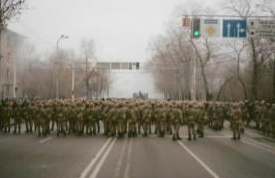By Mariana Navarrete, Arts & Culture Editor
Protests erupted in Kazakhstan in the first week of 2022. Although increasing gas prices triggered them, the civil unrest was caused by deeper frustration at the lack of political change. During the protests, the country shut down, and so as its internet, its economy, and its people.
Kazakhstan is a country located in Central Asia. It gained its independence from the Soviet Union at the end of 1991. Since then, President Nursultan Nazarbayev ruled with an iron fist for nearly 30 years. Nazarbayev got retired in 2019 and got succeeded by his ally Tokayev. The European Parliamentary Research Service says that even if Nazarbayev is not in power anymore, he still has considerable influence in the government.
Several countries have sparked civil unrest next to Central Asia in the last ten years. Ukraine in 2014, Armenia in 2018, and Belarus in 2020. Kazakhstan was not in the loop for civil unrest since it is considered a stable and prosperous country in Central Asia thanks to vast exports of oil, uranium, and other natural resources.
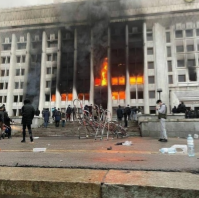
Former Saint Leo University student Dastan Marsbek lives in Almaty, a Kazakhstani city that hosted significant protests. Marsbek went to one that took place in the first week of January but quickly decided to go home since the government started to use force against them.
“There are many reasons why I and many others went to the protests. It all started in the West of Kazakhstan because of the unfair gas price rise, but later on, protests became political,” said Marsbek. “Long years of corruption and injustice were the main causes too.” Kazakhstan is part of the Russian-led military alliance through the Collective Security Treaty Organisation. On January 6, President Tokayev requested peacekeepers from the alliance to restore order in the streets. Even though he returned gas prices, riots all over Kazakhstan were still taking place.
“In the beginning, it felt very empowering to march peacefully around the city. We sang our national anthem, chanted “Шал кет!” which translates as “leave, old man” referring to our ex-president Nazarbayev, who though formally leaving his presidential post, still had a lot of political power,” Marsbek said.
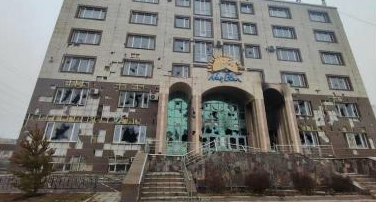
Marsbek enjoyed the spirit of the first protests he saw in the streets since they were peaceful and demonstrated how Kazakhstani people could organize themselves and request a social change. However, President Tokayev did not see them as peaceful and denounced protestors as ‘terrorists’ and ‘bandits’; he rejected international calls for dialogue and ordered police to shoot to kill.
“I felt like something was finally going to change because there have never been so many people protesting. I could feel the people struggling but with a strong spirit.” Marsbek said. “I felt free, and I felt like I was a part of a movement for a good cause.”
The worst previous violence was in 2011 when brutal repression of an oil workers’ strike killed at least 16 people. In contrast, eleven years later, over 160 people were killed in violent clashes, and more than 10,000 had been arrested during these January protests. Internet was blocked for several days, flights from Almaty were cancelled, and large parts of the economy such as oil exports shut down.
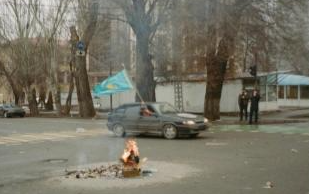
Marsbek claimed that the peacefulness of the protests turned into chaos. The military threw tear gas, smoke grenades at peaceful protestors, and unknown rioters took advantage of the situation to unleash havoc in the city.
The government shut down the internet for five days. Young adults like Marsbek tried to use virtual private networks (VPN) to have internet access. Connectivity was restored intermittently a few hours a day, but not everywhere.
Kazakhstan authorities introduced a state of emergency in the Mangystau Region, Almaty and some other cities. Amnesty International says authorities warned all media against “violating” Kazakhstan’s restrictive media law.
“When Notre Dame burned in Paris, the entire international community trembled. They donated millions of dollars; my friends posted stories on their Instagram saying how sad and terrible it was,” said Marsebek. “But when Kazakhstan’s government kills peaceful protestors and shuts down the internet in the entire country, the international community is silent; I do not see Instagram stories, hashtags, or massive donations.”
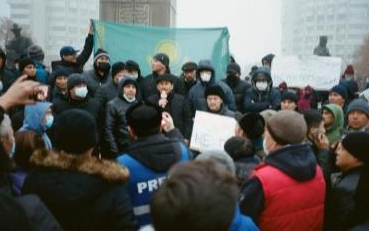
Some governments have indeed responded to the protests in Kazakhstan. The European Union published a statement imploring a peaceful resolution to the crisis. French President Macron and United Nations Human Rights Commissioner Michelle Bachelet also condemned the violence and urged the Kazakhstan government to respect freedom of assembly, expression, and media.
Although efforts have been made by the European Union, the American media as well as the government has been pretty silent about the issue. Even if Kazakhstan is far away from the U.S, these protests are important because of the U.S and Kazakhstan’s political and economic ties, as well as the human rights violations that occurred there. The United States was the first country to recognize Kazakhstan’s independence and has maintained close relationships ever since. It has billions in energy investment in Kazakhstan, with some of the significant American-owned companies, such as Chevron and ExxonMobil, having interests in Kazakh oil and gas fields.
It is also the first time the Collective Security Treaty Organization made a peacekeeping mission, and it could potentially develop consequences in the region, affecting it politically and economically.
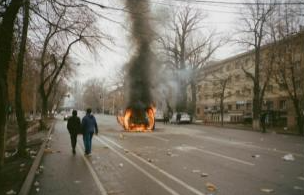
Aside from the political and economic damage, Kazakhstani people remained concerned about how the government recklessly violated human rights during the protests, together with the minimal response from the media and international community.
Marsbek said, “I wish people paid a little bit more attention to other people’s struggles in other parts of the world.”

